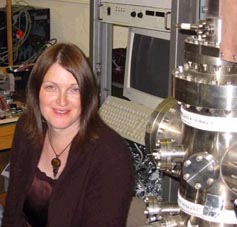"Outstanding" engineer awarded £800,000 research project

A Lancaster University engineer has been awarded over £800,000 for cutting edge research to develop the first ever compact particle accelerator.
Dr Rebecca Seviour has been identified by the Engineering and Physical Sciences Research Council (EPSRC) as an “outstanding researcher” who is a future leader in her field.
Her particle accelerator project is one of only six in the UK to be awarded funding by the EPSRC for “risky, original research” which will lead to new products.
Dr Seviour said: “It’s a real coup and a fantastic opportunity.”
Particle accelerators give high energy to subatomic particles but existing ones are up to 16 miles long and prohibitively expensive.
“Particle accelerators give scientists a unique tool for probing the small scale around us, everything from the origins of the universe to the structure of the human genome.The availability and use of these facilities is generally limited by their size and cost.
"A possible solution could lie in the use of Photonic Band Gap (PBG) structures and exotic materials. This project aims to combine experimental and theoretical studies with computer simulations to examine particle acceleration and high power RF generation using PBG structures.
“Such machines are not just the domain of the research scientist – they are also used in a number of applications from the production of plastics with memory to diagnostic and therapeutic medicine.”
A compact particle accelerator would be small enough to be housed inside a hospital, where it could be used to treat cancer.
Dr Seviour said: “The treatment of cancer in its most aggressive form involves bombarding it with radiation but this is dangerous.
“If we could instead move over to using particle accelerators then we could control the radiation with hadron therapy and only damage the tumour instead of the patient. It’s a national priority to develop a compact particle accelerator because it’s estimated that by 2050, Europe will need 40 hadron therapy centres. Making this technology more compact is crucial for the therapeutic or palliative care of patients.”
Another use is the transmutation of hazardous radioactive waste.
“We could reduce the time taken for the waste to decay from 5,000 years to 5 years so that would make it less of a problem to store.With the concerns over global warming, the Government is talking about building more nuclear power plants to provide energy instead of burning fossil fuels and we need to have plans in place to deal with the waste.”
Dr Seviour will lead a team of engineers and physicists from Lancaster University, the Cockcroft Institute near Warrington, Liverpool University and Madison-Wisconsin University in the US together with leading UK companies e2v and TMD.
The three year project will investigate the use of macroscopic Photonic Band Gap Structures, a collection of metallic rods arranged in a lattice. Researchers aim to manipulate defects in the lattice to develop a range of novel accelerator technology, which will have major implications for the vacuum electronics industry.
http://www.engineering.lancs.ac.uk/index.asp